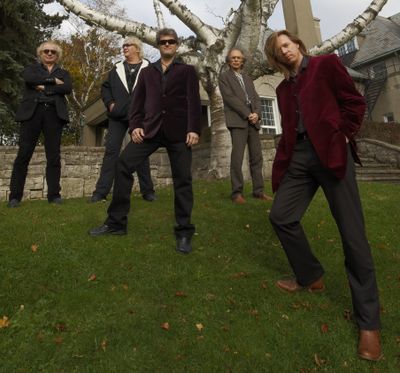Yes bring tour to Knitting Factory
Three original members on hand

It’s a good thing Alan White has “This Is Spinal Tap,” for reference.
After a four-decade career as the drummer for epic prog-rock band Yes, he’s still quick with his sticks, but his memory’s a bit foggy on some of the details.
With the “Spinal Tap” mockumentary, loosely based in part on several events that took place during Yes’ storied “Tales From Topographic Oceans” album and tour, White has more than a few reminders.
“Watching ‘Spinal Tap,’ there were moments like that on every tour, every day,” he said during a telephone interview while taking some down time between shows.
“There‘s that part in the movie when (the bass player) gets trapped in the plastic thing onstage – that whole part of the movie happened to me, but I vaguely remember it. I’m not sure of all the details, but I was supposed to come out of the stage when the Butterfly opened and I was stuck. I just sat in the floor.”
Regarded as the most easygoing member of the British band, White now lives with his European model wife in Seattle, where he spends his time away from Yes with his side project, simply called White.
When Yes postponed, and eventually canceled, plans for a 40th anniversary “Close to the Edge and Back” tour last year, it looked like band members would have more time to explore solo and side projects.
That changed with the discovery of Canadian prog-rock singer Benoit David. He’s fronting the “In The Present” tour that comes to Spokane’s Knitting Factory Concert House on Tuesday, billed as “Steve Howe, Chris Squire and Alan White of Yes.”
The lineup also includes Oliver Wakeman, sitting in on keyboard for his father, Rick, who bowed out of the anniversary tour on doctors’ advice.
Noticeably missing is signature vocalist Jon Anderson, who suffered a severe asthma attack and acute respiratory failure that led to the cancellation of that tour.
Searching the Internet, the rest of the group discovered David, who fronted a Yes tribute band, Close to the Edge, with convincing range and an expert job mimicking Anderson.
Band members told the press that David wasn’t a replacement for Anderson, but that he enabled them to tour for fans who had waited four years to see them live.
“He fits in really nicely,” White said. “We keep telling people he’s just standing in for Jon. If Jon gets well he’ll come back, (though) maybe not for long tours.”
Over the sprawling existence of Yes, the band has been through waves of mythic incarnations, all the while pushing the boundaries with classical song structures emphasizing vocal harmonies and abstract lyrics, extending its reach to jazz and symphonic aspects.
Known for his polyrhythmic prowess, White – hand-picked to play on John Lennon’s “Imagine” and George Harrison’s “All Things Must Pass” – replaced original Yes drummer Bill Bruford, who quit in 1972 to join King Crimson before the release of “Close to the Edge,” at the height of the band’s success.
After White’s audition, Squire threatened to throw him out the window if he didn’t join the band.
It took White just three days to learn the ambitious material that was featured on one of the first three-record live collections, “Yessongs,” recorded on their 1971-72 world tour.
“It was pretty intense,” said White. “I was used to picking things up pretty quickly, but it was different with Yes’ music because it was so very complicated.
“I would get up in the morning, and I’d be listening to music all day and learning parts. We really only had one rehearsal. It was a lot of homework, and everyone crossed their fingers and hoped we could make it through the whole thing.”
White is enjoying revisiting Yes’ sprawling catalog, including several rarely toured gems that have been brought into the set – including “Machine Messiah” and “Siberian Khatru” – along with familiar favorites like “Roundabout,” “Owner of a Lonely Heart” and “I’ve Seen All Good People.”
“Some of the longer, harder stuff I get a lot of satisfaction out of playing,” White said. “Some of the other stuff I could read a book and still play.”